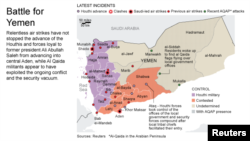The United Nations is calling for an immediate humanitarian pause to allow more life-saving aid to be brought into Yemen by air and sea.
Johannes Van Der Klaauw, U.N. humanitarian coordinator for Yemen, says basic services are collapsing and people are facing a crisis of unprecedented proportions as airstrikes and other armed actions have spread to 15 of the country’s 22 governorates.
The world deliberative body says millions of people are at risk of physical injury or death because of the fighting and the lack of basic services, including health care, safe water and food.
The World Health Organization reports 648 people have been killed and 2,191 wounded. The WHO also warned of measles, meningitis and typhoid outbreaks.
Van Der Klaauw says schools, health facilities, markets, power plants and other civilian infrastructure have been damaged and disrupted by the fighting.
“Shortages of food, shortages of fuel are now being reported across the country and, as a result, prices for food and commodities have increased significantly," he said. "Many areas in the country are now also experiencing frequent power cuts, shortages of water and fuel. In ... Aden, 1 million people risk being cut off from access to clean drinking water within a matter of days unless additional fuel is brought in."
Both the International Committee of the Red Cross and the U.N. Children’s Fund succeeded in bringing urgently needed medical and other supplies into Yemen on Friday. Van Der Klaauw said he is pleased that these relief flights were given the go ahead.
Van De Klaauw, however, also told VOA he is calling for a humanitarian pause because the occasional flight or shipload of goods allowed into the country is not sufficient to address the overwhelming needs. “We need many more of these flights coming in, many more of these boats coming in. So, in order to make this coordination of the aid coming in effective, we need to set up this mechanism and for that we need space…we need every day the air space cleared for the planes coming in and out,” he said.
Meanwhile, the U.N. refugee agency reports an increase in the number of people fleeing the war in Yemen. It said some 900 refugees have fled to Djibouti and to Somalia’s Puntland and Somaliland over the last 10 days. The vast majority are Somalis, followed by Yemenis and a small number of Ethiopian and Djiboutian nationals.
The International Organization for Migration reports it has received requests from 38 governments to help repatriate 13,000 nationals.





